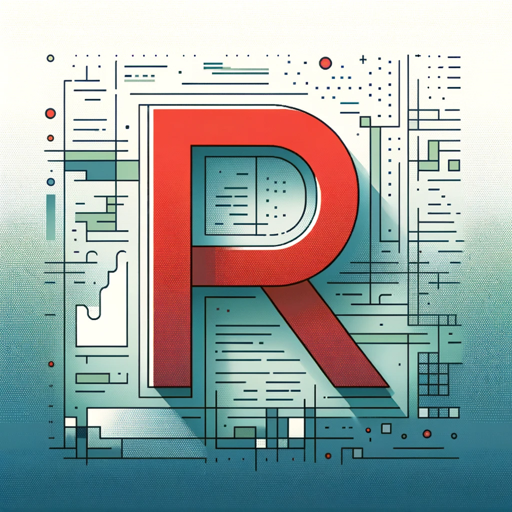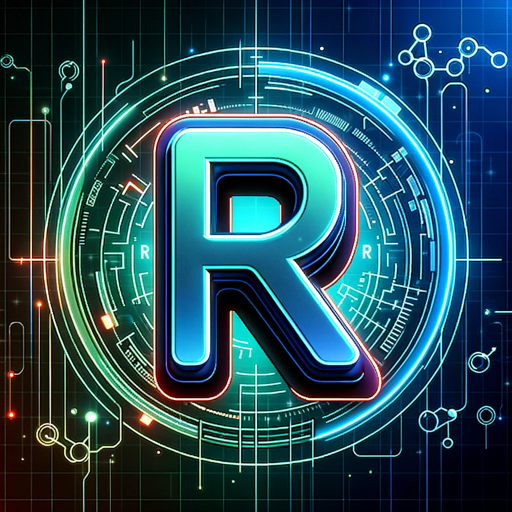R Programming Assist-AI-Powered R Programming Assist
AI-Powered R Programming Guidance
How do I plot a histogram in R?
Can you help optimize this R code?
What's the best way to visualize this data set?
How do I perform a linear regression in R?
Related Tools
Load More
R Wizard
A specialist in R programming, skilled in Data Science, Statistics, and Finance, providing accurate and useful guidance.

R coding - Advanced AI Assistant
Generates, explains, & optimizes R code

Advanced R Code and Statistical Consultant
The Most Advanced GPT for Statistics and R Code

R Language Assistant
Assists with R language coding

R-GPT
R Programming & Data Analysis Specialist

R Guru
Expert in R for data science, statistical analysis, machine learning and deep learning
20.0 / 5 (200 votes)
Introduction to R Programming Assist
R Programming Assist is a specialized AI designed to aid users in writing, debugging, and optimizing R code for data analysis and visualization. Its primary purpose is to facilitate efficient and effective use of R programming language in various data science tasks. The assistant leverages a comprehensive dataset of R programming examples, code snippets, and data visualization scripts to provide tailored solutions and insights. For instance, if a user needs to analyze a large dataset to find correlations between variables, R Programming Assist can help generate the necessary R code, explain the steps, and provide visualizations like scatter plots or heatmaps to illustrate the findings.

Main Functions of R Programming Assist
Code Generation and Optimization
Example
Generating R code to clean and preprocess data, such as handling missing values and normalizing data ranges.
Scenario
A data scientist needs to prepare a dataset for machine learning model training. R Programming Assist can generate the R code required to clean the data by filling in missing values, normalizing features, and splitting the dataset into training and testing sets.
Data Visualization
Example
Creating various types of plots, such as histograms, scatter plots, and box plots.
Scenario
A researcher wants to explore the distribution and relationships within their data. R Programming Assist can provide R code to create multiple visualizations that help in understanding the data's underlying patterns, such as a scatter plot to identify correlations or a box plot to observe the spread of data points.
Statistical Analysis Guidance
Example
Providing instructions and code for conducting statistical tests, such as t-tests, chi-square tests, and regression analysis.
Scenario
An analyst needs to determine if there is a significant difference between the means of two groups. R Programming Assist can guide them through conducting a t-test, including generating the R code, interpreting the results, and visualizing the data to support their analysis.
Ideal Users of R Programming Assist
Data Scientists and Analysts
These professionals benefit from R Programming Assist by obtaining quick, reliable R code solutions for data analysis tasks, enabling them to focus on interpreting results and making data-driven decisions. The assistant helps streamline their workflow by providing optimized code and visualization tools that enhance their analytical capabilities.
Researchers and Academics
Researchers and academics can leverage R Programming Assist to efficiently analyze and visualize their experimental data. By receiving guidance on statistical methods and code generation, they can ensure their analyses are robust and reproducible, ultimately aiding in the publication of their findings.

How to Use R Programming Assist
1
Visit aichatonline.org for a free trial without login, also no need for ChatGPT Plus.
2
Familiarize yourself with the interface, which includes options for data analysis, visualization, and statistical guidance.
3
Prepare your dataset and any specific questions or tasks you need assistance with, ensuring your data is clean and formatted correctly.
4
Utilize the chat interface to ask detailed questions about R programming, request code snippets, or seek advice on data visualization and analysis.
5
Review the provided R code or visualizations, test them in your R environment, and iterate based on feedback and additional queries.
Try other advanced and practical GPTs
Culture Concierge
AI-powered employee culture enhancement

GPT_Plus
Your versatile AI assistant for free.

Lily Girl Friend AI初恋女友
Your AI-powered personal assistant for emotional support and everyday tasks

Lingua Bridge
AI-powered translations with cultural context.

Free OCR | Photo / Image to Text with AI 🤖
AI-powered OCR for instant text extraction.

Remove Background from Image
AI-Powered Background Removal for Everyone

Liquid Programming
AI-powered dynamic content generation

CodeMastery-Programming
AI-powered coding insights and guidance.

Programming
Your AI-Powered Programming Companion

Smartphones Tablets Accessories Shopping Guide
AI-powered tool to find your perfect tech.

🌟Palm Reader Pro
Discover Your Destiny with AI-Powered Palmistry

Medicine Rounds
AI-Powered Medical Insights for Professionals

- Data Analysis
- Troubleshooting
- Code Optimization
- Visualization
- Statistical Modeling
Frequently Asked Questions about R Programming Assist
What types of R programming tasks can R Programming Assist help with?
R Programming Assist can help with data analysis, visualization, statistical modeling, code optimization, and troubleshooting errors in R code.
Do I need to have prior experience with R to use R Programming Assist?
While some basic knowledge of R is helpful, R Programming Assist is designed to provide guidance and support to users of all skill levels, from beginners to advanced programmers.
Can R Programming Assist help with specific data visualization techniques?
Yes, R Programming Assist can help with a wide range of data visualization techniques, including creating scatter plots, histograms, boxplots, and more advanced visualizations using libraries like ggplot2.
Is R Programming Assist capable of providing statistical analysis guidance?
Absolutely, R Programming Assist can guide you through various statistical analyses, including regression, hypothesis testing, and time series analysis, providing both code and explanations.
How can I ensure the code provided by R Programming Assist works in my environment?
Make sure your R environment is up-to-date with the necessary packages installed. Test the code snippets in small steps and adjust based on any error messages or unexpected results, using the assistant for troubleshooting if needed.